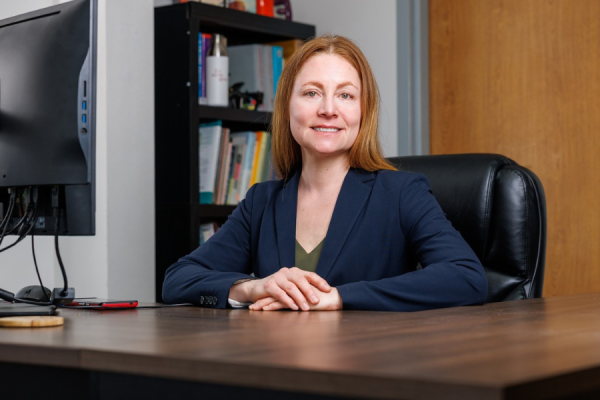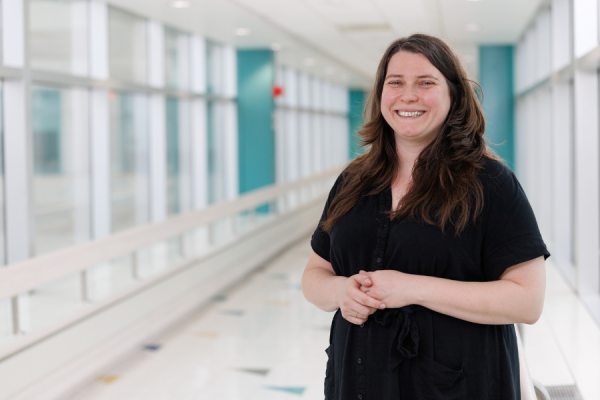Closing the Care Gap: Grant-Supported Program to Address Maternal Mental Health Crisis
View All NewsBy Grace Alvino, PhD
Pregnancy and postpartum are filled with profound moments: feeling that first kick, watching your belly grow, and seeing your baby smile. But alongside these joys can come challenges that are less often discussed, like hormonal shifts, mood swings, and postpartum depression.
Postpartum depression impacts up to 20% of new parents and can have long-term negative effects on families. If left untreated, postpartum depression can even lead to increased risks of behavioral health problems and cognitive delays in children.
To address these challenges, Temple Health is launching the Perinatal Collaborative Behavioral Healthcare (PCBH) program at Temple Women & Families Hospital, soon to open as the region’s only hospital exclusively dedicated to women and families’ health. The program will bridge longstanding gaps in maternal mental health by offering integrated behavioral health services to support the mental, emotional, and social wellbeing of pregnant and postpartum patients.
It's a transformative project—and one made possible by a nearly $700,000 grant from the William Penn Foundation. The funding was awarded through the Foundation’s Mental and Behavioral Health Services initiative, which invests in programs that expand access to behavioral healthcare for children and their caregivers.
Comprehensive Care for Every Patient
The multidisciplinary PCBH team will be embedded within Temple Women & Families Hospital and include bilingual licensed clinical social workers, psychiatrists, and peer support specialists. Every patient will be routinely screened for depression and perinatal mood and anxiety disorders, and their behavioral health will be monitored by their OB providers throughout pregnancy and postpartum.
Those identified as needing additional support will be immediately connected with PCBH team members. From there, therapists and care managers will evaluate each individual’s mental health and social needs.
These team members will work with behavioral health, obstetrics, and pediatrics to develop personalized care plans incorporating evidence-based therapies, peer support, talk therapy, and, if necessary, referrals to Temple’s Substance Use Disorder Clinic. Patients may also be linked to community partners to address housing or food insecurity.
To remove barriers to treatment, the program will use warm handoffs, proactive outreach, and close coordination with OBs and community organizations to improve postpartum care attendance and reduce missed appointments.
Unlike most models, the PCBH program will continue supporting patients until 12 months postpartum, providing sustained care to parents and children during an especially critical period.
Confronting the Leading Cause of Maternal Mortality
“The best thing for a baby is a healthy parent,” says Jessica Kovach, MD, Chair and Chief of Service of the Department Psychiatry and Behavioral Sciences at the Lewis Katz School of Medicine, and the clinical lead on the PCBH program. “But in Philadelphia, the leading cause of maternal mortality in the baby’s first year is substance use and mental health, which is why it’s so important that we address these issues.”

A little bit of care can go a long way. Often, new and expecting parents get better very quickly. But many people experience barriers to behavioral healthcare, from finding a provider who has open appointments to getting time off work to overcoming social stigma.
That’s why integrating these services into our OB care is key, says the program’s OB champion, Gail M. Herrine, MD, FACOG, IBCLC, FABM, Professor of Clinical Obstetrics, Gynecology & Reproductive Science at the Lewis Katz School of Medicine and Medical Director of Post-Partum at Temple University Hospital. “Our patients already trust their providers, and having our highly qualified PCBH team members in that same practice will help them feel comfortable and supported throughout their journey.”
Expanding on Proven Success
This integrated care model builds on Temple Health’s success in other departments, including family medicine, pediatrics, and internal medicine. Sarah Worthington, LCSW, an Integrated Behavioral Health Therapist, has seen how impactful this model can be.
It connects us with patients who might not otherwise be able to access therapy. And if someone shares a concern during a therapy session, like losing access to benefits, we can help them address it in real time, then refocus on their mental health.

For the last two years, Temple Health has offered perinatal psychiatric services at TUH-Episcopal Campus, including evaluations and medication management. The PCBH program will expand and fully integrate these services, coordinating treatment across psychiatry, obstetrics, and pediatric care.
Meeting Two Generations’ Needs
“There’s a clear link between a parent’s mental health and a child’s development,” says Dr. Kovach. “When a parent is struggling, it affects everything, from how often they bring their child to the doctor to their child’s behavior and cognitive outcomes.”
This understanding resonated with the William Penn Foundation, which looks to address the rising rates of anxiety and depression in children and their caregivers and the barriers to accessing behavioral health services.
“We were drawn to the program’s two-generation model, which supports children by addressing their parents’ mental health needs,” says Kellie Brown, Senior Program Officer for the Foundation’s Children and Families Program. “We’ve learned that treating these needs early on has a very positive impact on a child’s lifelong wellbeing.”
Brown also praised the program’s community-driven design. “Embedding mental healthcare into existing OB services shows a strong commitment to making services more accessible,” she says. “It also feels responsive to what we’ve heard community members say they need.”
Designed with and for the Community
Community engagement remains a core element of the PCBH program. Drawing on focus groups and participant feedback, the program will continually evolve to meet the needs of local families. By centering the voices of patients and community members, we hope to provide the most responsive, highest-quality care.
Nothing can make pregnancy and postpartum entirely stress-free. But thanks to the PCBH program, when things get overwhelming, it’ll be much easier to get help.